
The Generic Universal RolePlaying System, or GURPS, is a tabletop role-playing game system designed to allow for play in any game setting. It was created by Steve Jackson Games and first published in 1986 at a time when most such systems were story- or genre-specific.

The magic in Dungeons & Dragons consists of the spells and magic systems used in the settings of the role-playing game Dungeons & Dragons (D&D). D&D defined the genre of fantasy role-playing games, and remains the most popular table-top version. Many of the original concepts have become widely used in the role-playing community across many different fictional worlds, as well as across all manner of popular media including books, board games, video games, and films.

d20 Modern is a modern fantasy role-playing game system designed by Bill Slavicsek, Jeff Grubb, Rich Redman, and Charles Ryan. The system's core rulebook was published by Wizards of the Coast on November 1, 2002; by 2006, ten additional supplements were released. The game is based on the d20 System and the Dungeons and Dragons 3rd Edition ruleset. It includes various campaign settings along with the tools to build campaigns in modern/contemporary settings.

Alternity is a science fiction role-playing game (RPG) published by TSR in 1998. Following the acquisition of TSR by Wizards of the Coast, the game was discontinued in 2000 as part of a broader rationalisation of TSR's business holdings, but it retains a small and devoted fanbase. Parts of Alternity as well as TSR's classic Star Frontiers game have been incorporated into the d20 Modern game, especially the d20 Future setting. The first campaign setting for the Alternity game, the Star*Drive setting, was introduced in 1998.
The RPGA, was initially part of the organized play arm of TSR, Inc and later of Wizards of the Coast. From 1980 to 2014, it organized and sanctioned role-playing games worldwide. In 2014, it was replaced with the D&D Adventurers League.

A magic system, which might also be referred to as a magical system, is a set of rules that regulate the magical effects that can be produced in a fictional setting. Rules define all games, but magic systems have grown elaborate in role-playing games and video games because of the storage capacity of supporting literature and software respectively. There are positive feedbacks between the need to balance the game rules and the proliferation of game elements. A common feature of magical systems is either abide by its own environmental or physical law of nature, or use a method of limiting both the quantity and quality of spells that can be cast by a magic user.
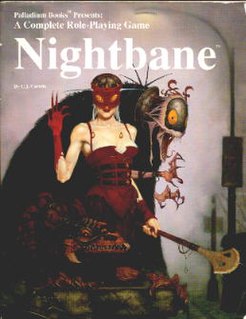
Nightbane is a dark fantasy role-playing game and setting created by C. J. Carella and published by Palladium Books.
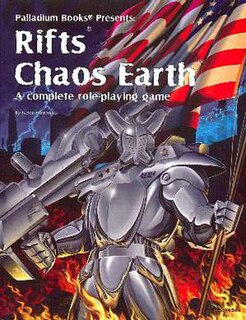
Rifts Chaos Earth is a post-apocalyptic role-playing game from Palladium Books. It is a spinoff and prequel to their popular game Rifts, which uses a similar form of Palladium's Megaversal system.

A role-playing game system is a set of game mechanics used in a tabletop role-playing game (TTRPG) to determine the outcome of a character's in-game actions.

Beyond the Supernatural is a horror role-playing game published by Palladium Books. It has seen two editions released, both of which have introduced innovations to Palladium's standard mechanics. A versatile horror-themed game, it lends itself well to wildly different play styles and narrative tones, from schlock splatter-horror to intense psychological horror, with an entire spectrum of terror in between. Beyond the Supernatural is implicitly set in the modern day, wherein magic and psychic powers are real and monsters and demonic cults exist, but out of the public eye. This, however, is not set in stone, and most of the character classes are flexible enough to account for variant settings or time periods.

Character creation is the process of defining a game character or other character. Typically, a character's individual strengths and weaknesses are represented by a set of statistics. Games with a largely fictional setting may include traits such as race and class. Games with a more contemporary or narrower setting may limit customization to physical and personality traits.
The warlock is a character class in the Dungeons & Dragons fantasy role-playing game. It was introduced as a non-core base class who practice arcane magic in the supplemental book Complete Arcane for the 3.5 edition of Dungeons & Dragons. In 4th and 5th edition, the warlock is a core class.

Recon is a role-playing game wherein players assume the role of U.S. military characters during the Vietnam War. It originally started as more of a wargame with role-playing elements, like Behind Enemy Lines and Twilight 2000, and gradually evolved into a full role-playing game.

Mutants in Avalon is the fifth supplement for the After the Bomb role-playing game, originally based on and compatible with Teenage Mutant Ninja Turtles & Other Strangeness. It was published by Palladium Books in January 1991 and uses the Palladium Megaversal system.
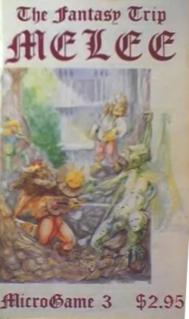
Melee is a man-to-man combat boardgame designed by Steve Jackson, and released in 1977 by Metagaming Concepts. In 2019, Melee was revived and re-released by Steve Jackson Games.

Dead Reign is a zombie apocalypse role-playing game published by Palladium Books. The first print of the main book was in November 2008.

Macross II: The Role-Playing Game is a role-playing game published by Palladium Books in 1993. Based on the Macross II mecha OVA and manga series, the game is structured around Palladium's Megaversal damage system.
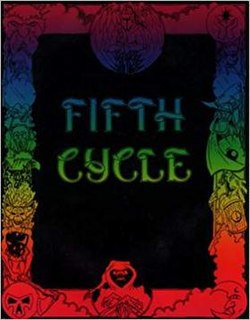
Fifth Cycle is a fantasy role-playing game published by Shield Games in 1990.
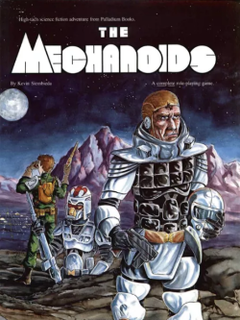
The Mechanoids is a science fiction role-playing game published by Palladium Books in 1985 that is based on the earlier role-playing game The Mechanoid Invasion.
Barony is a role-playing game published by Better Games in 1990.














